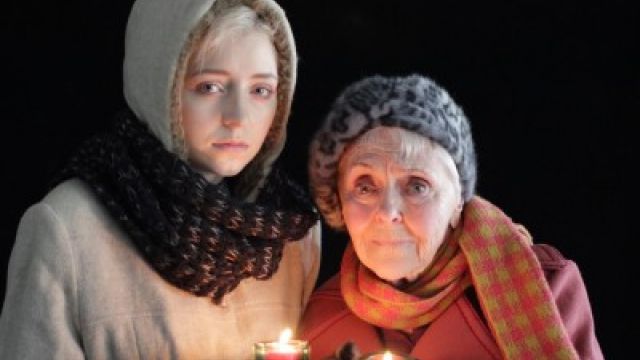Nought Point Five Above Zero - No Wind
Laura comes by bus from Helsinki to spend Christmas with her long widowed Mummi (grandmother) in Mummi’s small town. The weather is, of course, cold, hovering just above and just below zero. It’s better when there’s no wind. Laura (Sophia Riozzi), a stiff, pale young woman, appears tense, preoccupied, even faintly hostile. We might wonder why she’s come. It is mere duty? Tiny, bird-like Mummi (Shirley Cattunar) seems to be the only family she has. Mummi is affectionate and solicitous – but there’s a sense of dutiful hospitality, of her keeping her granddaughter at bay in the careful maintenance of a surface normality. She makes insistent offers of food and coffee. She worries about transport for their journey to the cemetery and the family graves, this outing being the obligatory centrepiece of Laura’s visit.
Underneath the repeated banalities, however, there is an intriguing tension, sadness and anger. It is no surprise to learn that Pinter is a reference for playwright Maria Kilpi. In a program note, she says that she is interested in ‘everyday rituals, everyday actions and sentences we keep repeating…’ The rationale behind the English language title escapes me. The Finnish title is Harmin Paikka – an untranslatable expression, apparently, for annoyance or, more aptly here, disappointment.
Those who have an ageing parent or grandparent may well recognise Mummi. She is old, she knows her time is almost up; she is lonely but finds people get on her nerves. She catalogues her dead partner’s irritating habits and failings, but misses them with an aching emptiness and regret. She is fearful of intruders and foreign neighbours. She watches the street and structures her time with those ‘everyday rituals’ – checking on the weather, meticulous planning of simple errands – and the unsatisfactory activities and excursions provided for ‘seniors’. She is ‘welcoming’, but, actually, she’ll be happy when you’re gone – and she can be alone again. You’re young – and she’s not. And you might well be tense, or impatient, or a bit brusque – like Laura – because you know about all these things and there is nothing you can do about any of them - but you must be there. You must – if only because your Mummi is the only link to a lost past and you must go to the cemetery and light candles. You must.
In this Mummi’s case, there is something else, something rather crucial that is, literally, lost in the translation. If you hadn’t read the program notes, you wouldn’t know. Mummi is from Karelia, far eastern Finland, something Finns would recognise at once from her dialect. Director Laurence Strangio tells us in his program note that Karelia lost much of its territory to the Russians in WWII. So Mummi is a displaced person, a witness to horrors, living now where she cannot feel she belongs. But when Laura asks her could she go back, Mummi replies, ‘There’s nothing there now’ – meaning ‘I cannot go back’ – or, ‘It’s too late now.’ It’s a source of irremediable sorrow under her light and bright demeanour. Laura’s enquiries about the past are tentative – and yet we feel she really wants to know. But, in any case, her questions are met with vague, one sentence answers before Mummi changes the subject – to bread or coffee or making sure Laura catches her bus. At the same time, Laura is keeping a private video diary in which she traces her ancestry, but in a way that suggests she and her forebears had no agency: as she tells it, there’s a mechanical, inevitable descent to her past. Only near the very end do we discover the reason for Laura’s sad preoccupation.
All this plays out on Mattea Davies set and under Bronwyn Pringle and Jason Crick’s northern winter light. It’s perhaps the most imaginative use of the tiny La Mama space that I’ve seen. It is both enclosed and yet suggests the wild, frozen, windswept winter Finland outside – aide by Christopher de Groot’s subtle sound design. By placing the playing space lengthened on the diagonal – with the audience either side – Mr Strangio’s mise en scene constantly suggests the psychic space between Laura and Mummi. Mr Strangio’s direction is, as usual, nicely judged. As he’s said in reference to another of his fine productions, he helps the actors find the truth and then gets out of the way.
Ms Riozzi’s Laura is quite off-putting at the start, but as the play proceeds and we are immersed in the dynamic of the characters, we realise that her performance is a finely judged mix of her character’s tension and her sadness. Unfortunately, at least during the performance I saw, the tension and poignancy is interrupted and weakened by Ms Cattunar’s need to be frequently prompted. She is a trooper of long and varied experience; perhaps this was a bad night. The text, with its apparently ‘knight’s move’ jumps isn’t one of obvious narrative drive. Yet the play survives this. It is a small and delicate piece the implications of which are far-reaching, hinting at the gap between generations, loss and regret, anger and defeat.
None of those things make it particularly ‘noir’ in genre terms – which Mr Strangio acknowledges. Perhaps ‘bleak’ is a better word, but that is not accurate either: Laura and Mummi connect in silence and in the fading light of the ‘gloaming’… just as Laura, having got no answers, but having done her duty, is about to leave.
Michael Brindley
Subscribe to our E-Newsletter, buy our latest print edition or find a Performing Arts book at Book Nook.

